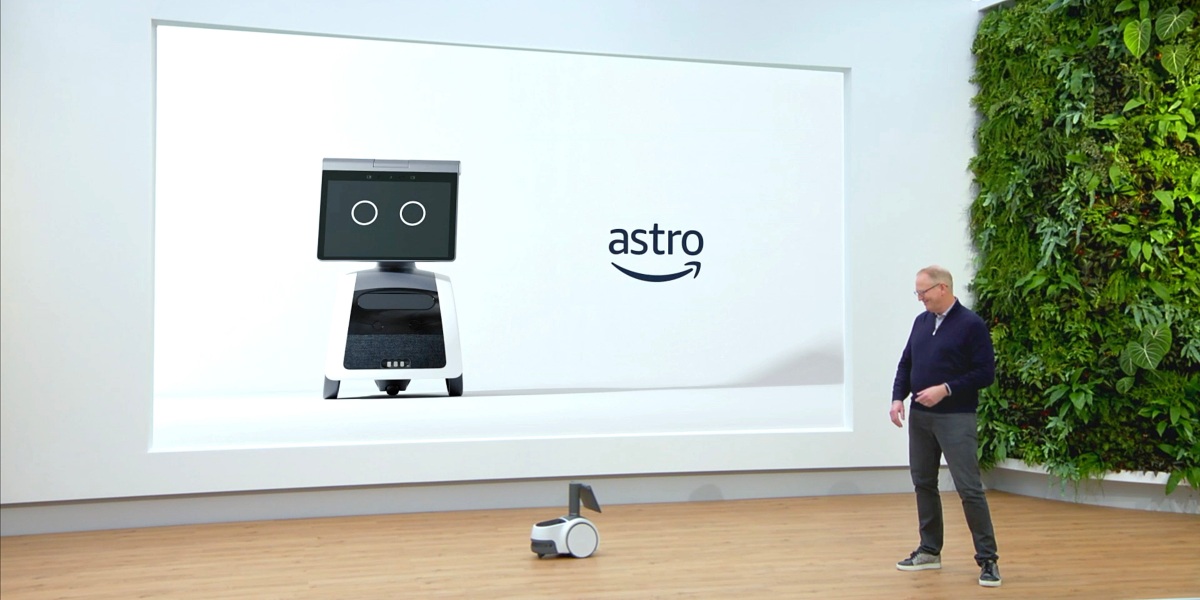Amazon.com’s Astro robot, unveiled to much fanfare last year but then shipped in very small quantities, is expected to become more widely available in the coming months, the company’s head of devices said.
Amazon is still working on issues related to Astro’s ability to map and navigate customers’ homes, said Dave Limp, senior vice president who leads its devices and services group. For now, robots are only available by invitation, and they remain rare outside of Amazon.
But the bot’s general availability “isn’t a year away,” Limp said in an interview. He said it would probably be sooner but was reluctant to predict a date. “I think we’re close,” he said. “I think we have a small problem to solve. But it’s in sight.
While it remains a work in progress, Astro played a prominent role in Amazon’s new device event on Wednesday, when the company said it was looking to turn the robot into a security guard for businesses. The announcement was part of a flurry of product news, including the launch of a sleep-tracking gadget and a Kindle e-reader that lets users write on digital pages.
Amazon’s Ring division also announced a pair of new home security cameras and other updated devices. Ring’s Spotlight Cam Pro – Ring’s most significant new hardware showcased at the event – will get radar cameras to enable 3D motion detection and a bird’s eye view. These features were previously included in Ring’s high-end doorbells to give a better picture of the surrounding environment, but now they will be more affordable.
Whatever Astro’s fate, home robots are set to become a bigger part of Amazon’s lineup. The company announced plans in August to buy Roomba maker IRobot Corp. for $1.65 billion. That deal has yet to be approved by governments around the world, but Limp told Bloomberg Television on Wednesday he was optimistic the deal would go through.
With a price tag of $1,000, rising to $1,450 after a launch period, the Astro robot will likely remain more of a niche product than Amazon’s Kindles or Echo smart speakers. But Limp and his team discussed plans for a larger release this week, he said, and they just want to beef up its browsing powers before Amazon rolls out the bot to all comers. Astro can still get confused in rare room configurations, such as areas with floor-to-ceiling glass near a mirror, he said.
Limp said Amazon had originally hoped to ship its first Astro units to guest customers before the end of 2021. Supply chain constraints prevented that from happening before the end of January or February, he said. declared.
Packaging Astro with sensors and four processors made it powerful enough to reassure Amazon engineers that it wouldn’t fall down stairs. But it also made the product more susceptible to supply shortages. “In many ways we overbuilt the hardware there,” Limp said.
More broadly, supply chain constraints have eased after a difficult period, Limp said on Bloomberg Television. “I don’t think we’re done,” he said, “but I can start to see a light at the end of the tunnel.”
Hundreds of thousands of people asked for invitations to buy an Astro, Limp said, adding he didn’t know how many of those requests would turn into actual sales.
Initial reviewers and some customers said the device, which looks a bit like a tablet on wheels attached to a cup holder, was lovely but lacking in must-have features. Limp said his teams are working to give Astro’s answers to questions more personality.
Limp said he was also surprised by the strong demand for the device from companies. This led Amazon’s Ring division to see Astro’s potential as a security guard.
As part of a pilot project, Ring is expanding its security monitoring service to leverage Astro’s capabilities. The robot could potentially investigate alerts, observe scenes with its cameras, and notify Ring-contracted security centers in cases where the police might need to be called. Ring plans to test the service in the coming months with a small group of companies.
Amazon acquired Ring in 2018 and made the band a key part of its hardware business. Beyond enlisting Astro, he incorporates more intelligence and abilities into his security gear.
New radar technology will allow Ring’s Spotlight Cam Pro cameras to better measure an object’s distance and trigger alerts more accurately. This addresses a complaint from some Ring owners, who said current cameras and motion sensors can set off false alarms.
The radar system will allow the camera to more accurately locate specific objects or tell if a human is in the frame. And the bird’s eye view feature shows an aerial image of movements picked up by Ring devices.
Amazon will sell a battery-powered version of the Spotlight Cam Pro for $230, with a solar-powered model costing $250. The Spotlight Cam Plus, a low-end alternative priced at $200, also gets a new design and will launch in the coming months, the company said. Ring’s latest panic button, a device that can be carried or wall-mounted, is cheaper than the previous model. It will cost $30, down from $35.
Some of Amazon’s innovations may take a while to catch on, if at all. Ring announced a flying indoor drone two years ago, but it’s still only available in limited quantities.
Sign up for the Makeshift Features mailing list so you don’t miss our biggest features, exclusive interviews and surveys.
#Amazon #large #version #Astro #home #robot #finally #sight






